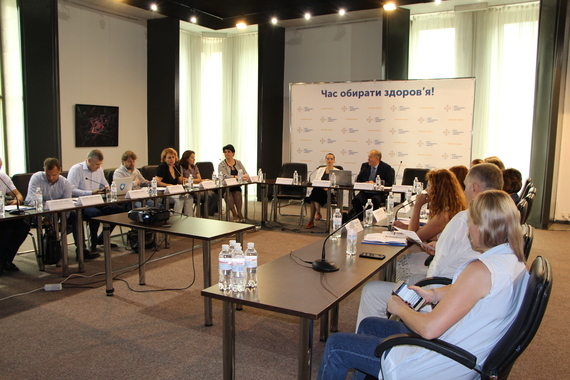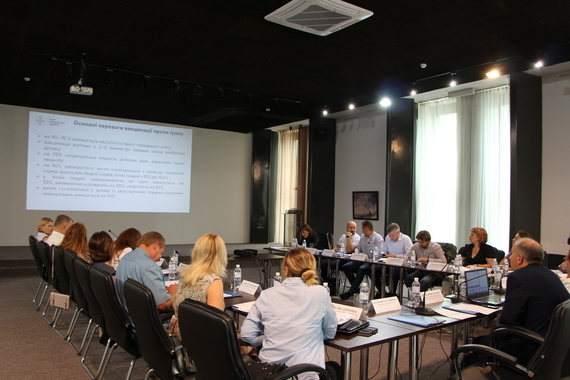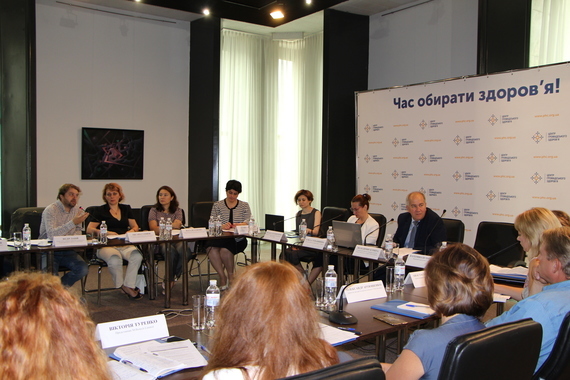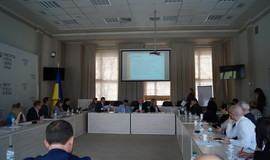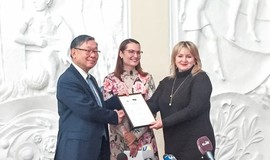News
Ukraine re-registers the recommended influenza vaccines for use in the forthcoming 2018-2019 season
On August 28, representatives from the Ministry of Health of Ukraine, the Public Health Center of Ukraine, the State Expert Center of the MoH of Ukraine, international and civil-society organizations, and vaccine suppliers discussed Ukraine's preparedness for the next influenza season and the importance of coordinated efforts aimed at increasing the coverage of influenza vaccination.
In Ukraine, influenza activity often begins to increase in October/November, and it can last as late as May, with most of the time flu activity peaks between December and February. Which is why, the forthcoming influenza season is expected to begin in October 2018 and last until May 2019.
The WHO recommended that the influenza virus vaccines for use in the 2018-2019 influenza season in Ukraine contain:
- an A/Michigan/45/2015 (H1N1)pdm09-like virus;
- an A/Singapore/INFIMH-16-0019/2016 (H3N2)-like virus;
- a B/Colorado/06/2017-like virus.
The WHO recommendation on vaccine composition is based on the year-round work of the WHO Global Influenza Surveillance and Response System (GISRS). Every year, national or regional public health authorities approve the composition and formulation of vaccines used in each country, in accordance with the WHO recommendations. National public health authorities are also responsible for making recommendations regarding the use of these vaccines and the prevention of influenza.
Through concerted actions of the Ministry of Health and the State Expert Center, the vaccines recommended for use in the 2018-2019 influenza season are being re-registered in Ukraine. One vaccine has already been registered in the country, the second vaccine has undergone the expert evaluation procedure, and the registration dossier for the third vaccine has been submitted for consideration by the State Expert Center.
These influenza vaccines are to be available in pharmacies in a month. All citizens will be able to purchase influenza vaccines at pharmacies nationwide and to get vaccinated at health facilities of their choice.
"The Ministry of Health of Ukraine, for its part, has taken the necessary steps to ensure the availability of influenza vaccines at pharmacies in a timely manner. Every citizen should get vaccinated, as this is the most effective way to prevent influenza and its complications," noted Olha Stefanyshyna, Deputy Minister of Health of Ukraine for European Integration.
According to statistics, a total of 6 million cases of infectious diseases are recorded annually in Ukraine, with influenza and acute respiratory viral infections (ARVI) accounting for about 98% of all cases. Still, vaccination rates remain very low.
Volodymyr Kurpita, Head of the Public Health Center of Ukraine, underlined that the flu vaccination rates were very low in Ukraine (approximately 0.5%) in the previous three years.
The Ministry of Health of Ukraine recommends local authorities and enterprises to purchase influenza vaccines to ensure seasonal vaccination of priority risk groups – health workers, teachers, children aged between 6 months to 5 years, pregnant women, the elderly, and individuals with chronic medical conditions.
Most health economics studies show that influenza vaccination is cost-effective. According to expert estimates, patients usually spend UAH 400-2,700 on the flu or ARVI treatment, depending on the severity of the disease. At the meantime, one dose of influenza vaccine costs UAH 200.00, and it protects against influenza during the entire season.
Seven influenza-related deaths were reported in Ukraine during the 2017/2018 season. In all cases, the deceased were not vaccinated against influenza.
The Ministry of Health of Ukraine reminds that influenza vaccines remain at the heart of public health preparedness and response efforts against both seasonal and potentially pandemic influenza viruses. The flu is dangerous for its complications. The best way to prevent these complications is to get vaccinated on time.
